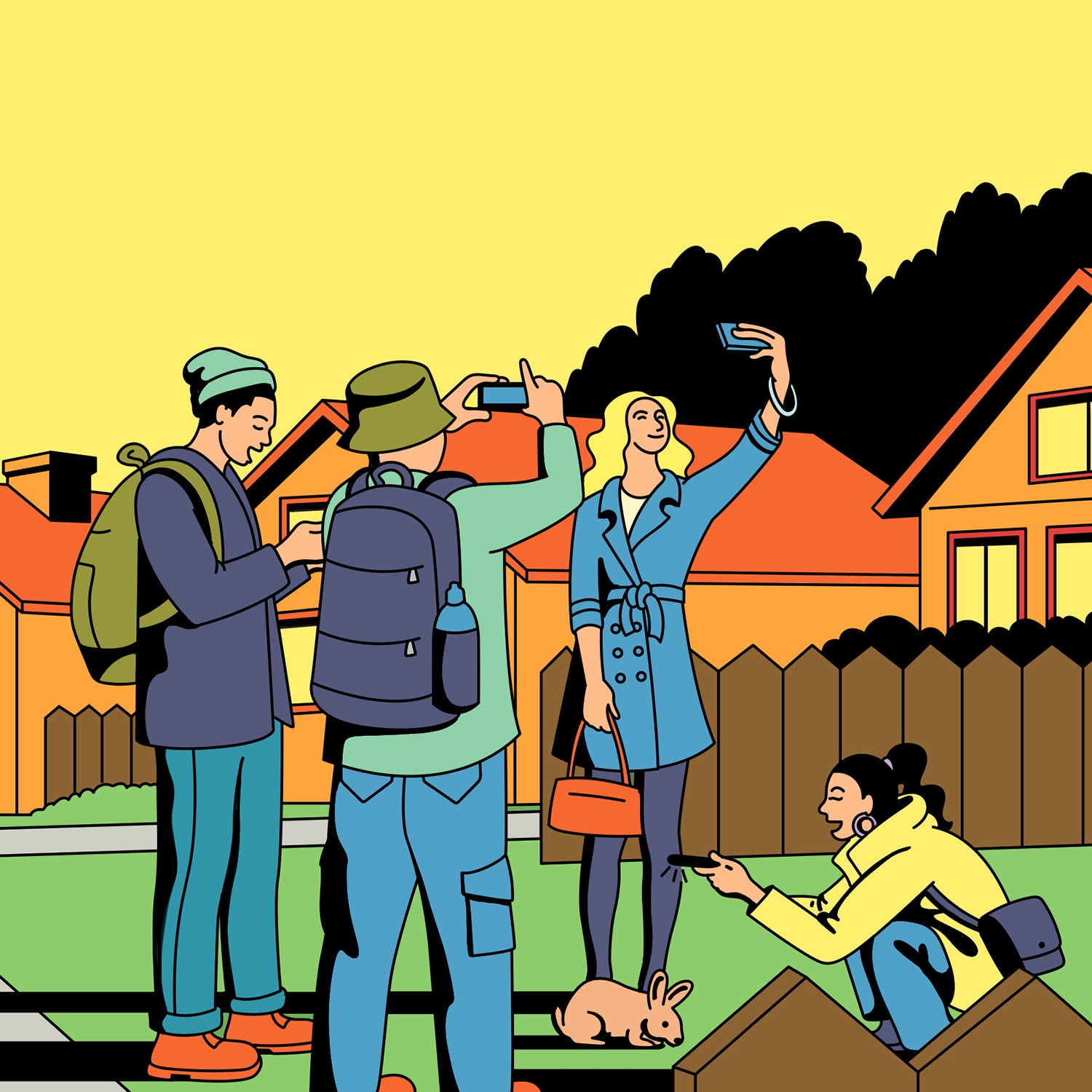Dear Sundog: For years, the house next door to me was rented by college kids and dirtbags. This summer, the owner evicted them and sold to a Californian who turned it into an Airbnb. Is this legal? Should I report them? —Victim of Real Estate Boom Outfall
Dear Outfall: Like so much of the web, Airbnb promised opportunity for the little guy simply by connecting buyer and seller in previously unimagined ways. And it worked magically. Years ago, Sundog and Ladydog rented a flat in Istanbul on a steep cobblestone hill where third-floor neighbors lowered coins in a basket on a rope to a baker who filled it with bread and pastries. The charm of it! We never would have set foot in that part of town had we stayed in one of the thousands of bland, overpriced tourist-trap hotels. We had an enchanted stay, and our host was paid handsomely in U.S. dollars. Everybody won, right?
Years later, the ethical ramifications of our lovely trip have become murky.
Just as Tinder yields , Instagram cultivates hustlers, Facebook spreads lies in ways that would have greened Goebbels with envy, and Twitter serves as Putin’s personal propaganda organ to peacefully win the New Cold War, so have Airbnb and VRBO invented new ways for predators to worsen the lives of regular people.
While the victim of Amazon’s success may be your beloved indie bookstore, and the loser in the streaming revolution��is that cool record store down the street, the carcasses left in Airbnb’s wake may not be as obvious. Sundog sheds no tear for hotels, just bland rebrands of the same soulless cubicles run by the big four: Wyndham, Marriott, Hilton, Holiday Inn. Rather, the collateral damage of the surge of short-term rentals through Airbnb and VRBO is the quaint neighborhoods in previously affordable cities. I’m not talking about ski towns, which simply would not exist but for the pocket money of the rich, but actual cities with normal non-trust-fund people with jobs.
Fueled by historically low interest rates, the entire U.S. housing market has jumped 17 percent in the past year, the sharpest rise since began tracking such data in 1996. Cities in the West have leaped far higher still: Boise (46 percent), Austin (42 percent), Kalispell (41 percent), Bend (39 percent), Missoula (35 percent),�� Phoenix (32 percent), Spokane (31 percent), Salt Lake City (28 percent), Tucson (28 percent), Reno (28 percent). This is fueled partly by the Zoom Boom, with the pandemic freeing thousands of wealthy people from the coasts to work remotely. It’s also driven by speculators who bid above market on homes with no intention of living in them, but rather to create a mini-hotel on a residential block.
To randomly pluck one town from this list, let’s look at Missoula, Montana, where for decades denizens stoically suffered long, gloomy winters and short, smoky summers, an ordeal eased or exacerbated—depending on your politics—by gobsmacking property taxes that build such virtue indicators as traffic roundabouts, pedestrian bridges, and ice-covered bike lanes. Rent was cheap, and the people endured the sleet huddled near grunting furnaces in uninsulated prewar gingerbread homes, stabbing locally shot elk steaks and gulping strong beer.
Now, with the arrival of the Zoom Boomers, the capitalist overlords have served up cauliflower tossed in buttermilk and chimichurri microtacos and Houseplant Jungle Tropikolsch, with its notes of mango, passionfruit, and guava. Houses that cost $350,000 in January 2020 now sell for half a million. Working people have fled to nearby defunct mill towns and Superfund sites. Rental vacancy is at less than 1 percent; meanwhile, planners estimate that a whopping 3 percent of homes are listed as short-term rentals, including such offerings as “Williamsburg, Missoula” and “BoHo Basement.”
And what do these tourists come to see in a city notorious for air pollution and ? Scrolling through Airbnb reviews, Sundog discovered at least one visitor gushing about deer grazing on the street. In other words, people just have buckets of money and are so cooped up and insane after two years of confinement that they are willing to burn it all on a trip to Montana to see garden pests trot on asphalt.��
There are several varieties of Airbnb ownership, each with its different set of ethical concerns. The least intrusive to a neighborhood is the person who simply rents out part of their own home—a spare bedroom or a mother-in-law unit. This meets the letter and the spirit of Airbnb’s initial mission, which was to “travel like a local,” to give tourists a less commercial homestay experience, and to provide income for house-rich/cash-poor owners.
The second type is the owner who rents their entire house and finds somewhere else to stay when guests arrive. Maybe they own another home or travel a lot. This may create clueless tourists wandering through the streets but doesn’t really affect the real estate metrics. The house remains owned by the same person, and there is benefit to having it occupied while they are absent.
The third type is insidious: the speculator who buys a home entirely to turn it into a nightly rental. explaining how simple this is to do, with such innocuously worded steps as “pick an attractive location” and “analyze available properties,” with no mention of things like learning who lives there or preserving what makes the street desirable in the first place. This tactic has no moral justification; the time-worn slogan of pimps and pushers comes to mind: buy for a nickel, sell for a dime. A business that enriches the owner while degrading the commons is unethical.
Fortunately, regular citizens have a tool for fighting back against the unscrupulous sharks hoping to get rich by draining the soul of the town: the government. Not even the most slavish Ayn Rand disciples dedicate much breath to their right to run a saloon in their basement or a sex show in their garage. Zoning laws prohibit that. Forward-thinking cities like tiny Hermosa Beach, California, had the backbone to ban short-term rentals in 2016. They have since allowed the rentals in commercial districts to landlords with a business license, and many larger cities have passed similar laws that attempt to impede the speculators. Los Angeles now requires owners to prove that a home is their primary residence, limits rental nights to 120 per year, and requires owners to run a gauntlet only��slightly less cumbersome than getting a tourist visa to North Korea.
Of course, the more complicated a law, the more difficult it is to enforce. This is where you come in, Outfall. If someone on your block is running an illegal hotel, consider it your civic duty to rat them out to the city. Tattling may not suit you. It feels bad. And yet Airbnb and VRBO have created a technology so effective that governments have been stymied in trying to preserve affordable neighborhoods, and your individual action is the best remedy.
You may find that your city has taken no action to protect locals from the AirBnBastards.��In this case, no law has been violated, and there is nothing to report. The work of protecting your neighborhood is not a quick call but a long campaign. You’ll first have to go through the regular channels of pressuring mayors, city councilors, and county commissioners to pass laws.
The right to affordable housing is not enshrined in any sacred documents—the Constitution, the Magna Carta, the Bible. Nonetheless, if communities determine that it matters, we can have it. We’ll just have to fight.
Got a question of your own? Send it to��sundogsalmanac@hotmail.com.


